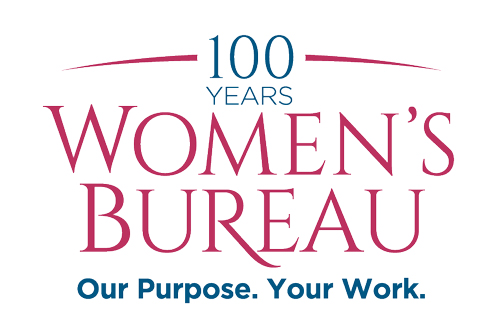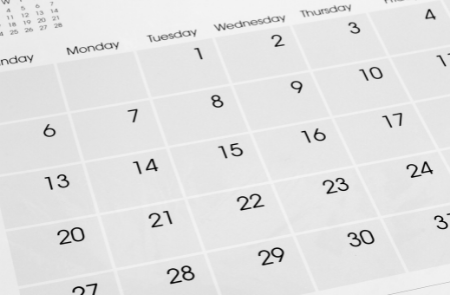
Celebrating Women’s History Month
Every March we commemorate Women’s History Month, recognizing the progress women have made, and reflecting on the current status of working women in America – and the work that remains to be done.
In addition, we recognized International Women’s Day, Equal Pay Day, Rosie the Riveter Day, and Women in Construction Week, and collaborated with a number of partners including the Equal Employment Opportunity Commission (EEOC), Wage and Hour Division (WHD), and UCLA’s Latino Policy & Politics Initiative, among others. Read more below about some of the events and activities we engaged in during this busy month.
New Report: Bearing the Cost: How Overrepresentation in Undervalued Jobs Disadvantaged Women During the Pandemic

On March 15, 2022, the Department of Labor released a report exploring how women, especially women of color, were impacted by the COVID-19 economic crisis, the role of occupational segregation, and how the Biden-Harris Administration is committed to addressing these disparities to create a more equitable economy.
Recognizing Equal Pay Day
WB on Capitol Hill – The Women’s Bureau joined Secretary of Labor Marty Walsh and Speaker of the House Nancy Pelosi for an Equal Pay Day event on Capitol Hill. During the event, WB Director Wendy Chun-Hoon and Senior Advisor Sarah Jane Glynn introduced the new Department of Labor report on the impact of the pandemic on women workers, and specifically women of color.
WB Voices from Across the Nation – WB Regional Administrators from coast to coast wrote and published Op-Eds this month addressing Equal Pay Day, the gender wage gap, and what the Women’s Bureau is doing to help close that gap.
- “Equal Pay Day: It is Everyone’s Business” by Charmaine Davis
- “Why are women in California paid 88 cents for every dollar a man makes?” by Kelly Jenkins-Pultz
- “Equal pay is achievable” by Jill Ashton
- “On Equal Pay Day, we see an achievable goal” by Nicole Neri
---
Secretary Walsh on Expanding Career Opportunities for Women – As part of the Department of Labor’s ongoing efforts to build an inclusive, equitable workforce & economy, we released a report on the negative impacts of occupational segregation.

In a video, Labor Secretary Walsh shares a few key takeaways on the consequences this has for our economy and how it worsens inequality.
---
White House Proclamation – The White House issued a Proclamation on National Equal Pay Day recognizing the significance of this day symbolizing how far into a new year a woman must work, on average, to earn what a man did in the previous year.

While we have made progress in shrinking the wage gap, there is still much to be done to ensure that women earn fair wages.
Website Updates and New Data

The Women’s Bureau website now has a new landing page: “The Impact of Gender and Racial Inequality on Women Workers”, which includes links to the “Bearing the Cost” report and related resources.
The Equal Pay page on the Women’s Bureau website has been updated with new resources on the gender wage gap and equal pay and pay transparency protections.
We have added a new data interactive showing earnings and earnings ratios by sex, race, and occupation group.
Celebrating Rosie the Riveter Day

In 2000, the Women’s Bureau joined the National Park Service to officially open the Rosie the Riveter World War II Home Front National Historic Park in Richmond, California. This year, WB Director Wendy Chun-Hoon traveled to Richmond, California to meet two Rosies, Marian Sousa (draftsman) and Marian Wynn (welder), who worked in the shipyards and supported the WWII war effort. She also attended a roundtable hosted by the Rosie the Riveter Charitable Trust to discuss the wage gap and empowering women workers.
Celebrating Women in the Trades

Building a Brighter Future: Engaging Women in Construction – March 6th through 12th marks Women in Construction Week. To commemorate, the Women’s Bureau in tandem with the Office of Federal Contract Compliance Programs, Wage and Hour Division, and Occupational Safety and Health Administration held a panel discussion to educate women about employment opportunities for women in the construction industry.
In addition, two women funded through the Women’s Bureau Women in Apprenticeship and Nontraditional Occupations (WANTO) grant shared how joining a “Women in Construction” programs changed their lives by giving them support to enter new career paths and helping them achieve economic stability
Commemorating International Women’s Day

March 8th marked International Women’s Day, a global day commemorating the contributions women have made and recognizing areas where more work is needed.
---
Women and Skills: Diverse Pathways to Prosperity – WB Director Wendy Chun-Hoon spoke at the U.S. Chamber of Commerce Foundation’s 12th annual International Women’s Day Forum to discuss how businesses, nonprofits, and governments can seize the moment to reinvent and drive sustainable progress for women.

---
Ending Gender-Based Violence in the World of Work – On March 9, WB Director Wendy Chun-Hoon participated in an ILO event on Ending Gender-Based Violence in the World of Work. She and Rosie Hidalgo, Special Assistant to the President and Senior Advisor on GBV at the White House Gender Policy Council, spoke on the Biden-Harris administration’s commitment to ending gender-based violence and harassment in the world of work.
U.S. Care Infrastructure: From Promise to Reality

The Care Infrastructure Conference explored critical issues and policy proposals for the care industry, including paid family and medical leave, care for older adults and people with disabilities, childcare issues, and racial/ equity issues in the industry. WB Director Wendy Chun-Hoon spoke on moving ahead with care infrastructure post COVID-19.
66th Commission on the Status of Women
Women’s Bureau Senior Policy Advisor Gayle Goldin spoke at a side event entitled “Equal Pay is Everyone’s Business: All Engaged in Advancing Women’s Economic Power” during to the 66th session of the Commission on the Status of Women in a session entitled “Equal Pay is Everyone’s Business: All Engaged in Advancing Women’s Economic Power”. The event was organized by the Government of Canada and co-sponsored by the United Kingdom, in collaboration with the Equal Pay International Coalition (EPIC) which is led by the ILO, the OECD and UN Women.
WB in the News
Several major news networks published articles on the Women’s Bureau’s event on Capitol Hill and the Department of Labor’s new report, “Bearing the Cost: How Overrepresentation in Undervalued Jobs Disadvantaged Women During the Pandemic.”
- Washington Post: Equal Pay Day falls earlier this year. Here’s what to know
- ABC News: Democrats push to close gender gap on Equal Pay Day
- Fox News: Pelosi marks Equal Pay Day with Labor Secretary Marty Walsh, says new data is 'heartbreaking'
- CNBC: Women in low-paying jobs are losing billions as U.S. gender pay gap persists, Labor Department says
A Look Ahead
Here’s a taste of what’s coming:

March 31 | Flipping the Script: Racial and Gender Equity in a Recovering Economy
Join the Women’s Bureau on March 31 from 1:00-2:00 pm ET to close out Women’s History Month as we and a panel of experts explore whether pandemic-related outcomes are likely to perpetuate longstanding patterns of gender or racial inequality or whether this is a "flip the script" moment with the potential for the recovery to usher in an era of greater equity and equality for Black women workers and indeed, all women workers.
April 26 | Equity in Focus: Job Creation for a Just Society
On April 26 from 12:30-3:00 pm ET the Women’s Bureau and the IRL Worker Institute at Cornell will hold the second webinar of the Equity in Focus: Job Creation for a Just Society series. The current crisis of inequality, made worse by the intersecting crisis of the pandemic and its impact on women and people of color, accelerates the need to envision job creation through the perspective of an equity lens and this second webinar will focus on the childcare sector.
We Want to Hear from You!

"Occupational segregation" is the gendered division of men and women into different types of jobs. It leads to women being overrepresented in certain jobs, which are generally valued and compensated less than male-dominated jobs.
We've heard from many working women about their experiences with gendered job expectations, the challenges they face at work, the supports that help them thrive, and the policy changes that would help them succeed.
Follow the Women's Bureau on Twitter: @WB_DOL

The Women’s Bureau has championed the rights of working women and served as a convener of conversations critical to an equitable economy for women for more than 100 years.
Follow us at @WB_DOL to view our #ThrowbackThursday series highlighting pioneering women, and to learn more about the latest research, initiatives, policies, and updates related to working women and their families.

